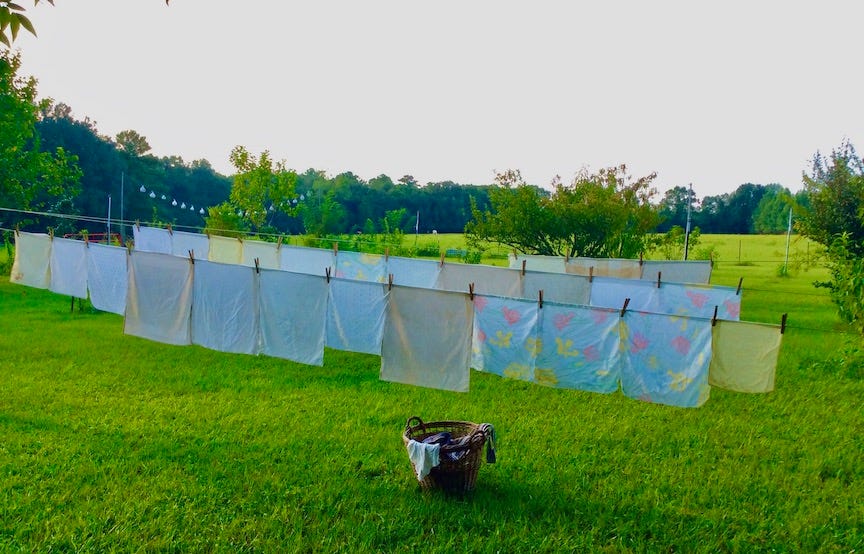When you’re working with a mountain of material, you have one major practical problem. Your brain is not a computer. It is not large enough, not normally, to arrange all the files & studies & references & flow-writes & ideas & drafts you’ve collected.
Therefore, how do you organize and arrange the pieces?
A superfluity of “stuff” in general has caused a need for information about organizing our homes, our closets, and our lives, which has inspired entire corporations, books, podcasts, magazines, and more.
With a longer writing project the stuff, however, is important. You need to collect and keep all the parts you can find.
The principles for organizing material are similar to those for Marie Kondoing your home.
Create a system of dividing the material into manageable parts. Organize by chapters, by subject, by month—whatever makes sense. Make and label folders for categories and subcategories.
Put like items together.
Declutter, if possible. (I don’t throw anything away. I make another folder marked “Peripheral” or “Maybe,” and the iffy material goes there.)
Train yourself to place info in its correct folder once you collect it.
Many apps have been developed for the sole purpose of solving this problem. Scrivener is best known, and it promises to “help you organize long writing projects such as novels, nonfiction books, academic papers, and even scripts.” In addition, there’s Chapterly, LivingWriter, Milanote, and probably many more.
I resist forces determined to computerize my life, and I hold out for the analog as long as humanly possible. For example, I purchased a mobile phone only two years ago, and still we don’t have cell service in the out-of-the-way place we happily live. Therefore, I am not a subscriber to online writing organizers.
Let me offer up a few alternative systems.
For John McPhee the folder was a literal folder into which all material on a specific topic went. When he began to write a chapter, he took out that folder only. He writes lovingly about this in his book on writing, Draft No. 4.
Some writers use note cards flipped out across a table.
Some clip index cards to a clothesline or pin them to a wall.
My writing teacher William Kittredge said to put 3x5 cards on a corkboard. "Keep staring at them. Keep reordering things," he said. Similarly, in From Where You Dream: The Process of Writing Fiction—lectures by Robert Olen Butler at Florida State University compiled and edited by novelist Janet Burroway—lobbies for a system of index cards that get shuffled and reshuffled.
Some write out pieces, arrange them on a bare floor in a logical, workable order, then clip them together.
Some tape scraps of paper together.
Faulkner's study has an outline for A Fable (1954) still readable in pencil on ivory-painted walls.
One of my favorite stories about arrangement came from Kittredge, who told me about a guy who wrote in a derelict Missoula hotel that was scheduled for demolition. The guy set up his typewriter in an empty room and scribbled outlines on the walls. When one room was filled, he moved to another. Although the story sounds like an urban myth, Kittredge swore it was truth.
Outlining and organizing gobs of material is vital for all writers of long works, and this is especially true for writers of creative nonfiction. Pick a system that works for you. It will save your (writing) life.
Writers Co-working Session Is Tomorrow 11:30am-12:30pm
Some writers from my world get together in a virtual writing room to focus together. The way it works is you
Choose a project to work on.
Join the free Zoom room.
Mute yourself on the computer & un-mute yourself on the page.
Let the energy of others lift you up.
Feel the gold dust that I sprinkle on you.
Get the work done.
Pat yourself on the back.
Topic: Writers Co-Working Session
Time: This is a recurring meeting.
Join Zoom Meeting
https://us02web.zoom.us/j/81679057457?pwd=UlhlM3ZSaUVPV21YdlQ3MXJlWmxQZz09
Meeting ID: 816 7905 7457
Passcode: 415285
Looking for a Writer
A friend called this morning and is looking for a ghost-writer or co-writer. This person experienced a very unusual situation during the civil rights era and is eager to get her story written. She would prefer a black writer who lives in Georgia. She is in correspondence with a highly recommended literary agent, but if that doesn’t work out, she wants to independently publish, in which case experience with KDP would be helpful. Either way, my friend needs a writer. The research is complete. I believe the project could be written quickly, in a matter of a few months. In terms of money, you could negotiate assistance with your bills while you write and/or a percentage of royalties. If this project interests you, I can put you in touch, or if you know someone who meets the qualifications, please forward this message on. Many thanks.
River Teeth Book Contest
River Teeth's editors conduct a yearly national contest for a book-length manuscript of literary nonfiction in English. All manuscripts are screened by the co-editors of River Teeth. The contest winner receives $1,000 and publication by The University of New Mexico Press. The reading fee is $27.
Deadline for Submissions: October 31
Final Judge: Lacy M. Johnson






I knew that. I’m on vacay and I just totally forgot. I was actually writing though. I hope the session was good and I look forward to joining soon.
Thank you for this! I hope to make it tomorrow. Really appreciate the info at the bottom of post.